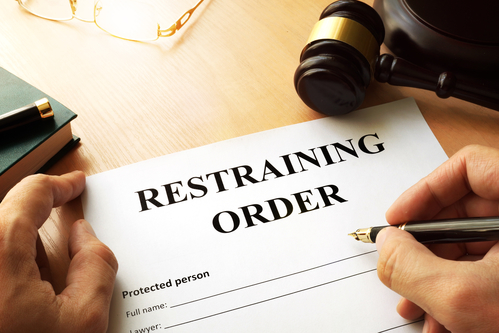 During a divorce, emotions run high, and individuals often say and do things that they might later regret. There’s no doubt that a divorce can often bring out the worst in a person. Because of the high tensions throughout the divorce process, some people may wonder if filing a restraining order against their spouse is an option. If it is an action you are considering, there are a few things that you should know.
During a divorce, emotions run high, and individuals often say and do things that they might later regret. There’s no doubt that a divorce can often bring out the worst in a person. Because of the high tensions throughout the divorce process, some people may wonder if filing a restraining order against their spouse is an option. If it is an action you are considering, there are a few things that you should know.
Different Types of Restraining Orders
First, you should be aware that there isn’t a single type of restraining order, and most of them are reserved for protecting victims against their abusers. There are actually several different types of restraining orders, and most of them are filed separately from anything pertaining to your divorce. Here is a bit of information about each of these types of restraining orders to help you determine which might be applicable to your situation:
-Emergency Protective Orders – These are usually issued by police in cases where the threat of harm is imminent, or when the victim or potential victim can’t file for a restraining order right away. These usually only last 3 to 7 days, so the individual has time to petition for a more permanent order.
-Restraining Orders – Also known as protective orders, a restraining order is more long-term, and can last several years or even a lifetime. They can also be renewed or amended based on changing circumstances.
-Domestic Violence Restraining Order (DVRO) – This type of restraining order is only put into effect after a domestic violence case, which, if applicable to your situation, would occur separately from your divorce hearing. The judge over the domestic violence case would determine if a DVRO should be issued.
If none of these types of restraining orders applies to your situation, but you still feel you need additional protection from your spouse during divorce proceedings, there is still one other option available to you, and it is designed specifically for use during a divorce.
Temporary Restraining Orders
A Temporary Restraining Order (TRO) is likely the most relevant type of restraining order for a standard divorce case, where there is no history of domestic violence. This type of order can be placed by the court if you fear retributive action from your spouse after you file the petition for divorce. For example, if you fear that your spouse may empty your bank accounts, pack up your kids and move them out of state, or dispose of your possessions, a TRO can be put in place to protect you from such actions.
It is usually best to file your request for a TRO when you first file your divorce petition, so that protective measures can be put in place as soon as possible. However, if you did not do this, you can request a Temporary Restraining Order at any time during the divorce proceedings. A TRO will remain in effect until the divorce proceedings are over. If, after your divorce is complete, you feel that you need further protection, you will have to file for one of the restraining orders mentioned in the previous section.
Any TRO issued by the court must be customized to address your specific concerns, so it is usually best to discuss this with an attorney to ensure that all necessary protective measures are put in place.
Deciding If You Need a TRO
Because most restraining orders are designed to protect victims from their abusers, you might feel that filing one against your spouse is a drastic measure, especially if he or she has no history of violent behavior. But bear in mind that a Temporary Restraining Order is designed specifically for people in your situation, and no history of violence is required to get one.
Even if you don’t believe your spouse will do anything harmful, it is usually better to request a TRO and ensure that you are protected in the event that your spouse’s emotions override their better judgment. As the saying goes, it is better to be safe than sorry. Even in the most amicable of divorces, points of contention can arise that may push people to do things they’ll later regret.
So, speak to your attorney before you file your divorce complaint, and ask them about submitting a request for a Temporary Restraining Order as well. This will help to protect you, your family, and all of your assets throughout the divorce proceedings. Contact The Harr Law Firm today for assistance in filing your divorce petition and a TRO request.